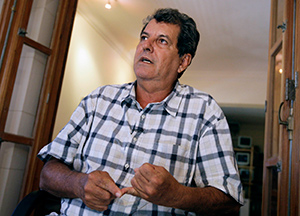HAVANA –– Lay Catholic leaders in Havana were among those mourning the death of Oswaldo Paya Sardinas, a champion of civil and human rights, coordinator of Cuba’s Christian Liberation Movement and founder of the Varela Project, who was killed in a car accident July 22.
 Cuban dissident Oswaldo Paya, leader of the Christian Liberation Movement, is pictured in a 2010 photo in Havana. Paya, who spent decades speaking out against the communist government of Fidel and Raul Castro and became one of the most powerful voices of dissent against their half-century rule, died in a car crash July 23. He was 60. (CNS photo/Enrique De La Osa, Reuters)The laity magazine Espacio Laical posted a note seeking prayers for Paya and his family and friends, and calling him “an honest man, an exemplary family man, a Catholic of integrity, a good Cuban and a politician who invariably acted according to his conscience.”
Cuban dissident Oswaldo Paya, leader of the Christian Liberation Movement, is pictured in a 2010 photo in Havana. Paya, who spent decades speaking out against the communist government of Fidel and Raul Castro and became one of the most powerful voices of dissent against their half-century rule, died in a car crash July 23. He was 60. (CNS photo/Enrique De La Osa, Reuters)The laity magazine Espacio Laical posted a note seeking prayers for Paya and his family and friends, and calling him “an honest man, an exemplary family man, a Catholic of integrity, a good Cuban and a politician who invariably acted according to his conscience.”
Paya, 60, and another Cuban activist, Harold Cepera, were killed when the car in which they were driving struck a tree, about 14 miles outside the city of Bayamo in Granma province. Two other passengers in the rental car, a Spaniard and a Swede, were injured and reported to be recovering in a Bayamo hospital.
Paya was a Catholic who was public about his faith and its influence on his work, even during the years when Cuba was an officially atheist nation and being active in a church carried social and employment ramifications. The Varela Project advocates peacefully for democratic reforms in Cuba.
Though the Catholic Church has no official involvement with the Varela Project because of its political activities, it was named for Fr. Felix Varela, a 19th century Cuban priest who was involved in the country’s first independence movement. Fr. Varela was declared venerable in April.
The Cuban government said the car’s driver apparently lost control and veered into a tree. But a prominent Cuban blogger, Yaoni Sanchez, said in a blog that she was told by witnesses that another car intentionally hit Paya’s vehicle, causing the crash.
A notice posted on Paya’s blog page by the Christian Liberation Movement said the circumstances of the deaths were not clear and called for a transparent investigation into the cause of the crash. It said its members mourn the deaths of Paya and Cepera.
“These are painful times for the families of Oswaldo and Harold and our prayers and thoughts are with them,” it said. “These are painful times for the Christian Liberation Movement, but we will continue our commitment and our work inside and outside Cuba until sovereignty and freedom are returned to the Cuban people.”
Paya was nominated several times for the Nobel Peace Prize. In 2002, the European Union awarded him the Andrei Sakharov Prize for human rights work.
The fifth of seven siblings in a Catholic family, Paya was jailed as a young man for criticizing the communist government. The Associated Press reported that he worked for the Public Health Ministry, specializing in electronic medical equipment.
In the late 1980s, he founded the Christian Liberation Movement, leading to his detention again in 1990. The Varela Project began in 1996, seeking signatures on petitions to the government pushing for reform.
President Barack Obama was among those sending condolences. In a statement, Obama noted that Paya “gave decades of his life to the nonviolent struggle for freedom and democratic reform in Cuba.”
“We continue to be inspired by Paya’s vision and dedication to a better future for Cuba and believe that his example and moral leadership will endure,” Obama’s statement said.
